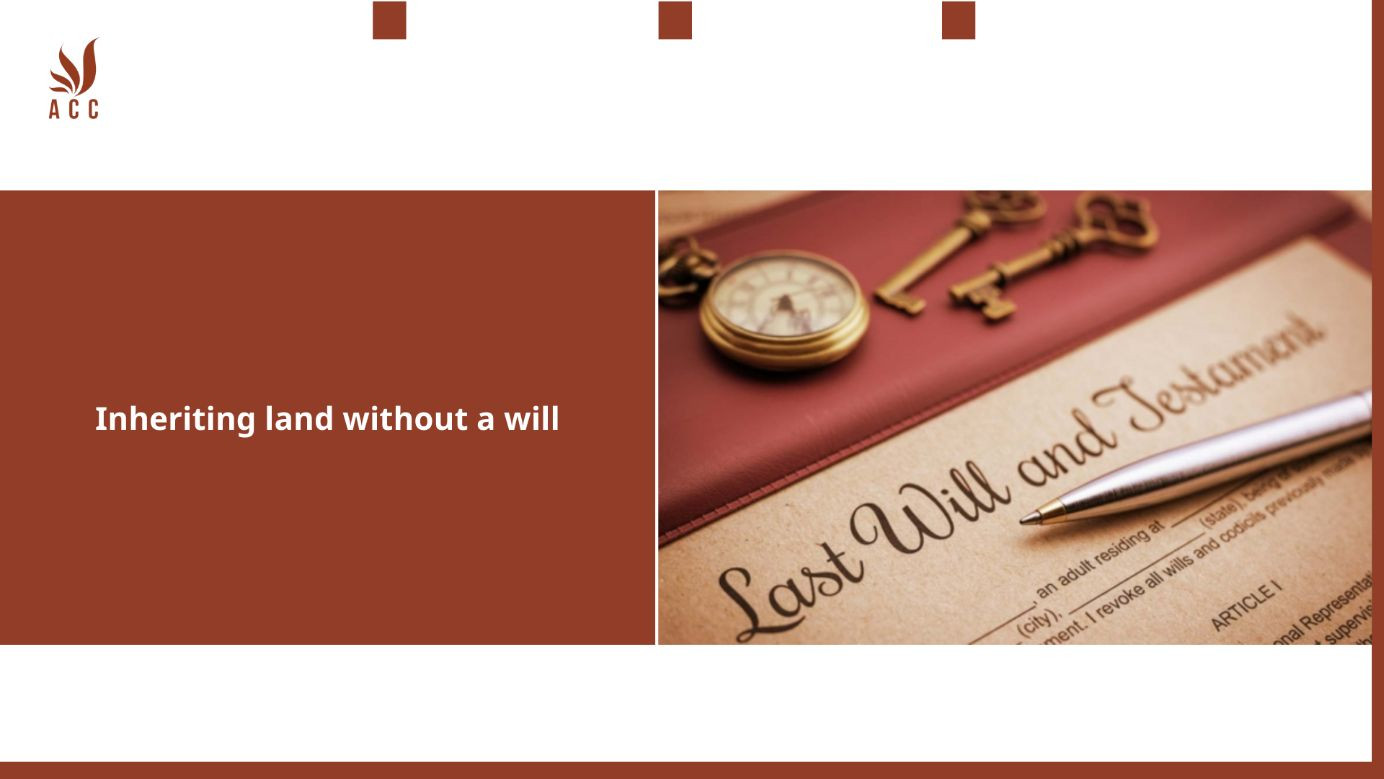Inheriting land without a will typically follows the laws of intestate succession, which govern the distribution of a person's assets when they die without a valid will. The specific procedures and rules for inheriting land without a will can vary by jurisdiction (country or state). Here's a general overview of how the process works:
1. Determine the Jurisdiction:
The first step is to determine the jurisdiction where the land is located, as the laws governing intestate succession and property distribution can vary from one place to another.

2. Identify the Heirs:
The law of intestate succession generally prioritizes close family members as heirs. Typically, a surviving spouse and children (if any) are the first in line to inherit the land. If there is no surviving spouse or children, the inheritance may pass to other close relatives, such as parents or siblings, depending on the jurisdiction's laws.
3. Administrator Appointment:
In many cases, a court will appoint an administrator or executor to oversee the distribution of the deceased person's assets, including the land. The administrator is responsible for ensuring that the property is transferred to the rightful heirs according to the laws of intestacy.
4. Notice to Heirs and Creditors:
The administrator is usually required to provide notice to known heirs and potential creditors that the estate is being probated. This notice may be published in a local newspaper, and known heirs are directly informed.
5. Inventory and Appraisal:
The administrator must create an inventory of the deceased's assets, including the land, and arrange for their appraisal to determine their value. This is necessary for calculating the distribution of assets among heirs.
6. Payment of Debts and Expenses:
Before distributing the land to the heirs, the administrator must settle any outstanding debts and cover the expenses associated with administering the estate. This includes funeral expenses, legal fees, and other bills.
7. Distribution of the Land:
Once debts and expenses are paid, the land is typically distributed to the heirs based on the laws of intestate succession. The specific distribution may vary depending on the jurisdiction and the relationship of the heirs to the deceased.
8. When using ACC Law Firm's testament, entrepreneurs will receive
When using ACC Law Firm's testament, entrepreneurs will receive professional legal advice and assistance in drafting a comprehensive and legally binding will that reflects their specific business needs and objectives. The testament will ensure the smooth transition of their business assets and help protect their interests and those of their beneficiaries. Additionally, entrepreneurs will have access to ongoing support and guidance from experienced attorneys who specialize in estate planning for entrepreneurs.
9. Q&A
1. What happens when someone inherits land without a will (intestate succession)?
- When a person passes away without a will, the process of inheriting land typically involves the following steps:
- Determine the applicable laws: The first step is to identify and understand the intestate succession laws in the jurisdiction where the land is located. These laws vary by location and dictate the order and distribution of land among potential heirs.
- Identify potential heirs: Identify and locate potential heirs, such as surviving spouses, children, parents, or other close relatives, as determined by the intestate succession laws.
- Establish the estate: If necessary, an executor or administrator may be appointed by the court to oversee the distribution of the land and manage any debts or liabilities associated with the estate.
- Distribute the land: Follow the legal order of priority outlined in the intestate succession laws to distribute the land to the rightful heirs.
2. Who is responsible for managing and administering inherited land when there is no will?
- When there is no will, the court typically appoints an executor or administrator to handle the administration of the estate, including the management and distribution of inherited land. This person is often a close family member or a neutral third party appointed by the court.
3. Can disputes arise among potential heirs when inheriting land without a will, and how are they resolved?
- Yes, disputes among potential heirs can arise when inheriting land without a will, especially if there are disagreements regarding how the land should be distributed. In such cases, the probate court may hold hearings to determine the rightful heirs and resolve conflicts. Legal representation is often recommended for those involved in such disputes.
4. Are there any taxes or fees associated with inheriting land without a will?
- Depending on the jurisdiction and the value of the land, there may be estate taxes, inheritance taxes, or probate fees associated with inheriting land without a will. These costs can vary widely and should be discussed with a legal professional or tax advisor to ensure compliance with local laws and regulations.
Nội dung bài viết:






Bình luận